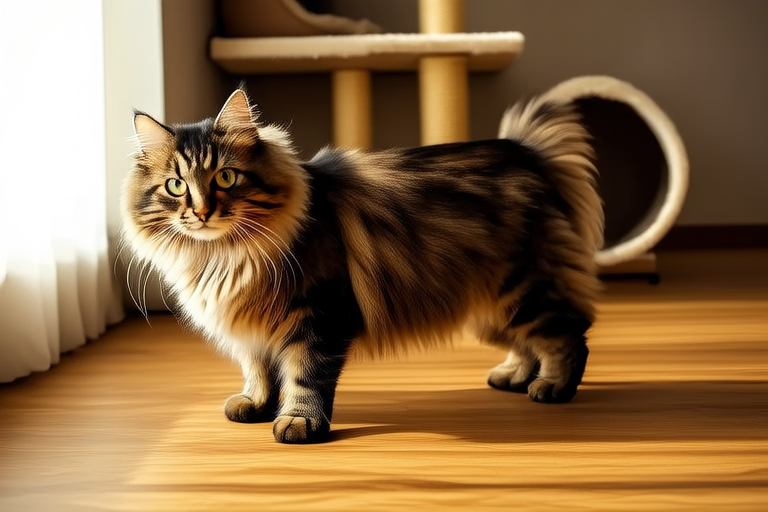Maine Coon Cat Care Guide
Welcome to your comprehensive Maine Coon cat care guide! Whether you’re a new or experienced owner, this guide will provide you with all the necessary information to ensure your feline friend leads a healthy and happy life.
Diet and Nutrition
Proper nutrition is vital for the health and longevity of your Maine Coon. These cats have a hearty appetite and can eat a lot, so it’s important to monitor their food intake to avoid obesity. A balanced diet should include high-quality protein sources such as chicken, fish, and turkey, along with essential vitamins and minerals.
Consult your veterinarian to determine the appropriate amount of food for your cat based on age, weight, and activity level. Fresh water should always be available. Avoid feeding them table scraps or human foods that can be harmful, like chocolate, onions, and garlic.
Grooming Needs
Maine Coons have long, silky coats that require regular grooming to prevent matting and tangling. Brush your cat at least once a week, more frequently during shedding seasons. Use a slicker brush to remove loose hair and prevent hairballs.
Bathing is generally unnecessary unless your cat gets into something particularly messy. If bathing is required, use a gentle, pet-friendly shampoo and be sure to thoroughly rinse out all soap residue.
Trimming nails and cleaning ears are also part of grooming. Keep an eye on your cat’s dental hygiene by brushing their teeth regularly with a toothbrush and toothpaste designed for cats.
Exercise Requirements
Despite their large size, Maine Coons are quite active and enjoy playing. Provide interactive toys that stimulate their hunting instincts, such as feather wands, laser pointers, or puzzle feeders. Encourage climbing and jumping by setting up cat trees or shelves.
Regular play sessions help maintain a healthy weight and reduce boredom-related behaviors. Consider supervised outdoor time if your yard is securely enclosed, but always keep them indoors for safety.
Health Considerations
Regular veterinary check-ups are crucial for early detection and prevention of diseases. Maine Coons are prone to certain health issues, including hip dysplasia, hypertrophic cardiomyopathy (HCM), and polycystic kidney disease (PKD). Discuss genetic testing options with your vet to screen for these conditions.
Vaccinations and parasite control are also important. Follow your vet’s recommendations regarding vaccinations, flea and tick prevention, and heartworm protection.
Temperament and Behavior
Maine Coons are known for their friendly, affectionate nature. They often form strong bonds with their owners and enjoy being involved in family activities. They are generally good with children and other pets, making them ideal companions for households with families.
These cats are intelligent and curious, which can sometimes lead to mischievous behavior. Provide mental stimulation through interactive toys and puzzles to keep them engaged and prevent boredom.
Training Tips
Training your Maine Coon can be fun and rewarding. Start with basic commands like “sit” or “come” using positive reinforcement techniques such as treats and praise. Consistency is key when training any animal.
Teach them proper litter box habits early on by placing them in the litter box after meals and praising them when they use it correctly. If accidents occur, clean them up without scolding your cat, as this may discourage them from using the litter box.
Living Environment Setup
Create a comfortable, safe space for your Maine Coon by providing cozy bedding, scratching posts, and plenty of vertical space for climbing. Cats love perches where they can observe their surroundings.
Adequate ventilation and temperature control are important, especially since Maine Coons are sensitive to heat. Ensure your home has multiple escape routes in case of emergencies. Secure windows with screens to prevent accidental falls.
Socializing with Other Pets
Maine Coons typically get along well with other animals, but introductions should always be done gradually under supervision. Allow them to sniff each other through a closed door before allowing direct contact.
Monitor interactions closely for signs of aggression or discomfort. If problems arise, separate the pets and consult with a professional trainer or behaviorist for guidance.
Conclusion
Caring for a Maine Coon requires commitment and attention to detail, but the rewards are immeasurable. By following this guide, you’ll be well-equipped to provide your cat with the best possible care throughout its lifetime. Remember that every cat is unique, so adapt these guidelines according to your pet’s individual needs.
